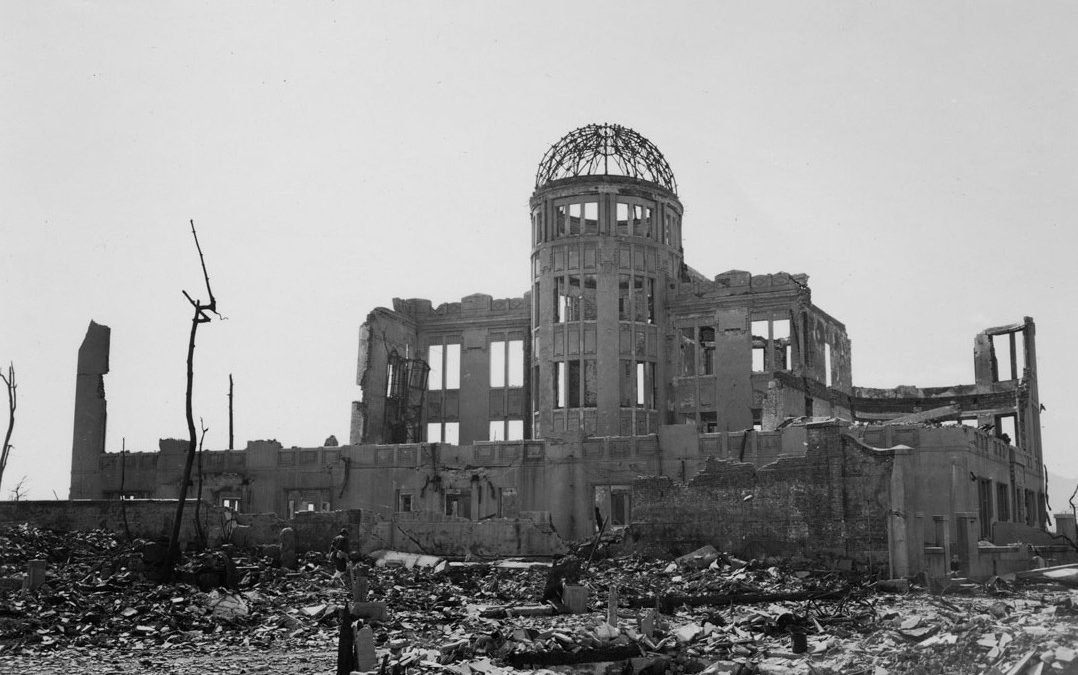“I have been to the pit of hell twice. I should be dead. Every morning, I give thanks for my miracles.” Tsutomu Yamaguchi
8:15 a.m., August 6, 1945 – Hiroshima, Japan: Tsutomu Yamaguchi was excited. The 29-year-old naval engineer’s 3-month work assignment in Hiroshima was over. An employee of Mitsubishi Heavy Industries, he had spent the summer working long hours on the design of a new oil tanker.
Yamaguchi was headed to the shipyard one final time before going to the railway station to catch a train for the 190-mile ride to his home in Nagasaki. He was looking forward to seeing his wife, Hisako, and their infant son.
Yamaguchi heard the familiar drone of an American B-29 bomber overhead. Looking skyward, he saw the plane drop a small object connected to a parachute. Suddenly, there was a brilliant flash of light, followed by an ear-splitting boom, and a shock wave which spun him around and tossed him 15 feet into a ditch. Knocked unconscious, when Yamaguchi came to, his arms and face had been badly burned and both eardrums ruptured. He was unsure what had happened.
Yamaguchi would later learn that the plane in the sky over Hiroshima had detonated the world’s first atomic bomb. He had been less than two miles from ground zero. The horror he saw that day would haunt him for a lifetime. In shock and tremendous pain, he eventually found his way to an air raid shelter, where he received treatment for his burns and spent an agonizing, sleepless night.
Despite his injuries, Yamaguchi was determined to get back to his family. The following day, he made his way to the only operating rail station and caught a train to Nagasaki. He arrived in the early morning of August 8 and limped to the hospital to have his burns re-dressed. When he finally arrived at his house, Hisako did not recognize him because of his blackened, burned face and bandages.
Despite her protest, Yamaguchi reported to work at Mitsubishi the following morning, August 9, at 7 a.m. He explained to his manager that he had almost been killed three days earlier by a single bomb that had destroyed Hiroshima. “It was so large,” said Yamaguchi, stretching out his hands, “That I thought the sun had fallen from the sky.” The boss challenged him, “Tsutomu, one bomb cannot destroy a city of 250,000. You are mistaken.”
As they discussed the devastation in Hiroshima, suddenly at 11:02 a.m., there was a brilliant, blinding flash, followed by a tremendous explosion, which blew out the windows of the office building, causing serious structural damage. Yamaguchi and his boss were thrown across the room.
Because the office building was behind a small hill, it was saved from total annihilation, and Yamaguchi was not seriously injured by the blast. Through the chaos, he headed home, fearing the worst for his family. While he cried for Hisako in front of his house that had been reduced to rubble, she walked up the street. Hisako and the baby had been grocery shopping two miles away and were unharmed.
In the days that followed, Yamaguchi discovered that another American B-29 Bomber had dropped a second atomic bomb on Nagasaki. More than 70,000 people were killed instantly. Once again, he had been less than two miles from nuclear ground zero and survived. A week later, Japanese Emperor Hirohito surrendered, ending World War II in the Pacific.
The two nuclear bombs killed an estimated 210,000 Japanese civilians, 140,000 in Hiroshima, and 70,000 more in Nagasaki. Thousands more died prematurely from cancer and liver disease related to high radiation exposure.
Because of double radiation exposure, doctors warned Yamaguchi that he would soon die of radiation poisoning. He experienced high fever and vomiting for a week, and he lost his hair, and the hearing in one ear, but Yamaguchi was otherwise healthy. After the war, he served as a translator for the Japanese occupational forces before returning to Mitsubishi, where he worked until retirement.
In his later years, Yamaguchi became a vocal proponent of nuclear disarmament. He frequently gave talks about his experience and expressed hope that nuclear weapons would one day be abolished. In 2006, at age 90, Yamaguchi spoke at the United Nations summit. He and Hisako were married for 70 years before she died from liver cancer. He died two years later from stomach cancer at age 93
Tsutomu Yamaguchi is the only person officially recognized by the Japanese government as a dual survivor of both atomic bombs. Frequently asked if he was the luckiest or unluckiest man in the world, he responded, “I am the most thankful man in the world. The whole world needs to hold hands and prevent this kind of war.”

A heartwarming story. Thanks for sharing.
My son Jonathan now works for Toyota in Greensboro, NC. He had an opportunity to travel to Japan for a few weeks for work last year. While there, he went by the building you show in the picture in Hiroshima. He wanted to see some of the Hiroshima stuff on his own, and he is probably one of the few in this next generation who know how devastating nuclear war can be.